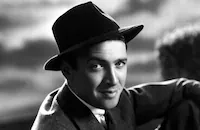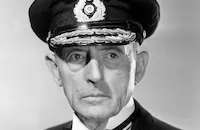Of Human Hearts, set in the Ohio frontier of the mid-1800s, stars Walter Huston as Ethan Wilkins, an upstanding and morally rigid preacher who is barely able to provide for his family. As his son, Jason, Stewart appears only in the second half of the movie, with a young actor named Gene Reynolds filling the role in the earlier scenes. The conflict arises from Jason's desire to better himself; he becomes a doctor without thoroughly appreciating the family sacrifices that have allowed him to do so. In one of the final scenes Jason, who has distinguished himself as a battlefield surgeon during the Civil War, is called to the White House by Abraham Lincoln (John Carradine). The young doctor is chastised by Lincoln for neglecting his now-widowed mother, who has written to the President thinking her son was killed in action. Filled with remorse, Jason attempts to set things right.
Of Human Hearts was a pet project for director Clarence Brown, who had acquired the rights to the original story Benefits Forgot, by Honore Morrow, and had tried for some time to convince MGM to allow him to film it. The studio had reservations about a Civil War story considered box-office poison in the days before Gone With the Wind (1939) became a smash hit but finally gave Brown a green light after his success with the film version of Eugene O'Neill's turn-of-the-century comedy Ah, Wilderness (1935). Brown insisted upon Stewart to play the grown son, providing the young actor with one of his first opportunities to show his depth and range. Stewart biographer Donald Dewey writes that "His emotional persuasiveness in a monologue to Bondi that veers back and forth from contempt for the family's living conditions to a wonder at the mysteries contained by human bones, rates as one of his best screen moments before World War II."
The film was shot primarily at California's Lake Arrowhead, where art director Cedric Gibbons oversaw the construction of a frontier town with about 50 buildings, plus cornfields, cabbage patches, a wharf and a steamboat. A contest was held to select a new title for the movie, which had been filmed under Morrow's original title. The winner was 17-year-old Roy Harris, who came up with Of Human Hearts and had the honor of seeing the movie premiered in his hometown of Greenville, SC, in February 1938. Brown always considered the movie to be one of his best, and the critical notices were glowing. In the New York World Telegram, William Boehnel praised Brown's "knowing and imaginative direction," and hailed the film as "easily the most genuinely moving" of its season. Unfortunately, the somber story line worked against the movie at the box office, and it was not a commercial success.
Bondi was Oscar-nominated as Best Supporting Actress for her performance. The other movies in which she plays Stewart's mother are Vivacious Lady (1938), Mr. Smith Goes to Washington (1939) and the legendary It's a Wonderful Life (1946). In 1970 he persuaded her to come out of retirement for one last turn as his mother on the TV sitcom The Jimmy Stewart Show. In the opinion of Stewart biographer Gary Fisgall, Bondi "was never better than she was in Of Human Hearts. Her simple, good-hearted woman, torn between a stubborn husband and a callow son, provided the picture's solid core."
Producer: John W. Considine Jr.
Director: Clarence Brown
Screenplay: Bradbury Foote, from Honore Morrow story Benefits Forgot
Art Direction: Cedric Gibbons, Harry Oliver
Cinematography: Clyde De Vinna
Costume Design: Dolly Tree
Editing: Frank E. Hull
Original Music: Herbert Stothart, William Axt (uncredited), Edward Ward (uncredited)
Principal Cast: Walter Huston (Ethan Wilkins), James Stewart (Jason Wilkins), Beulah Bondi (Mary Wilkins), Gene Reynolds (Jason as a child), Guy Kibbee (George Ames), Charles Coburn (Dr. Charles Shingle), John Carradine (Abraham Lincoln).
BW-104m. Closed captioning.
by Roger Fristoe




































